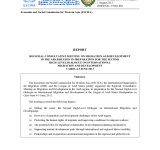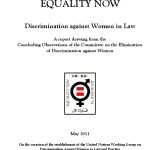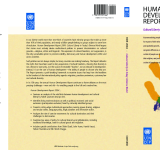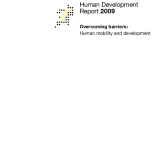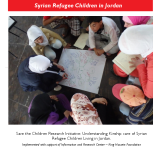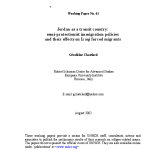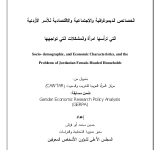immigration
يدور موضوع هذا التقرير حول الملاحظات الختامية للجنة اتفاقية القضاء على كافة أشكال التمييز ضد المرأة (سيداو) التي تتعلق إما بالقانون أو بغيابه حيث يحاول التقرير تصنيف الملاحظات لبيان أنماط التمييز
Accommodating people's growing demands for their inclusion in society;; for respect of their ethnicity;; religion;; and language;; takes more than democracy and equitable growth. Also needed are multicultural policies that recognize differences;; champion diversity and promote cultural freedoms;; so that all people can choose to speak their language;; practice their religion;; and participate in shaping their culture—so that all people can choose to be who they are. In recent years the Human Development Report has argued strongly that this is as much a question of politics as economics—from protecting human rights to deepening democracy. Human development is first and foremost about allowing people to lead the kind of life they choose—and providing them with the tools and opportunities to make those choices. The 2004 Report builds on that analysis;; by carefully examining—and rejecting—claims that cultural differences necessarily lead to social;; economic and political conflict or that inherent cultural rights should supersede political and economic ones. Instead;; it provides a powerful argument for finding ways to “delight in our differences”;; as Archbishop Desmond Tutu has put it. It also offers some concrete ideas on what it means in practice to build and manage the politics of identity and culture in a manner consistent with the bedrock principles of human development.
Migration;; both within and beyond borders;; has become an increasingly prominent theme in domestic and international debates;; and is the topic of the 2009 Human Development Report (HDR09). The starting point is that the global distribution of capabilities is extraordinarily unequal;; and that this is a major driver for movement of people. Migration can expand their choices —in terms of incomes;; accessing services and participation;; for example— but the opportunities open to people vary from those who are best endowed to those with limited skills and assets. These underlying inequalities;; which can be compounded by policy distortions;; is a theme of the report. The report investigates migration in the context of demographic changes and trends in both growth and inequality. It also presents more detailed and nuanced individual;; family and village experiences;; and explores less visible movements typically pursued by disadvantaged groups such as short term and seasonal migration.
his 2005 Human Development Report takes stock of human development;; including progress towards the MDGs. Looking beyond statistics;; it highlights the human costs of missed targets and broken promises. Extreme inequality between countries and within countries is identified as one of the main barriers to human development—and as a powerful brake on accelerated progress towards the MDGs. The report suggests that the world's governments are faced with a choice. They can start a decade for development with the financial resources;; technology and capacity to end poverty or we could have a human development failure. “Business as usual” will not allow fulfilling the promises and the commitments made in 2000. The cost of this failure will be measured in human lives;; increased inequalities;; violations of human rights and threats to peace.
Throughout history water has confronted humanity with some of its greatest challenges. Water is a source of life and a natural resource that sustains our environments and supports livelihoods – but it is also a source of risk and vulnerability. In the early 21st Century;; prospects for human development are threatened by a deepening global water crisis. Debunking the myth that the crisis is the result of scarcity;; this report argues poverty;; power and inequality are at the heart of the problem.The 2006 Human Development Report continues to frame debates on some of the most pressing challenges facing humanity.
This paper argues that Jordan has adopted a semi-protectionist policy towards Iraqi forced migrants;; i.e. letting them in but depriving them of a status;; therefore encouraging them to move forward. For their part;; despite minor differences;; Western countries all have adopted a reverse semi-protectionist policy;; i.e. limiting forced migrants access to their territories but granting those who have managed to enter liberal asylum while never deporting Iraqis back to the Middle East. Moreover;; Jordan and its Western partners are in agreement as regards the security threat posed by this new wave of forced migration while Middle Eastern Arab countries are still burdened by the unresolved case of Palestinian refugees.
هدفت الدراسة الى التعرف على الخصائص الديموغرافية والظروف الاقتصادية والاجتماعية للأسر التي ترأسها امرأة وتحديد طبيعة المشكلات التي تواجهها وابناؤها وبالتالي تحديد اوجه واولويات التدخل وطبيعة المساعدات التي يمكن تقديمها لهذه الأسر. اعتمدت الدراسة المنهج الكمي والنوعي;; حيث استخدمت التحليلات الاحصائية SPSS;; واجراء المقابلات الفردية ومجموعات نقاش مركزة. عينة الدراسة كانت 1200 اسرة على مستوى الاقاليم الثلاث (شمال;; وسط;; جنوب) وكانت العينة عشوائية. وكما تم بناء استبيان لجمع البيانات. ولقد خرجت الدراسة بمجموعة من النتائج. وكما قدمت الدراسة مجموعة من التوصيات لمساعدة هذه الأسر في التغلب على النظرة النمطية والضغوط الاقتصادية.
